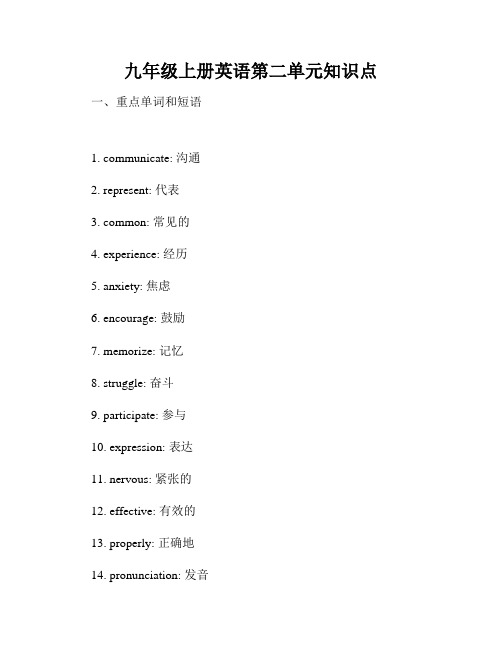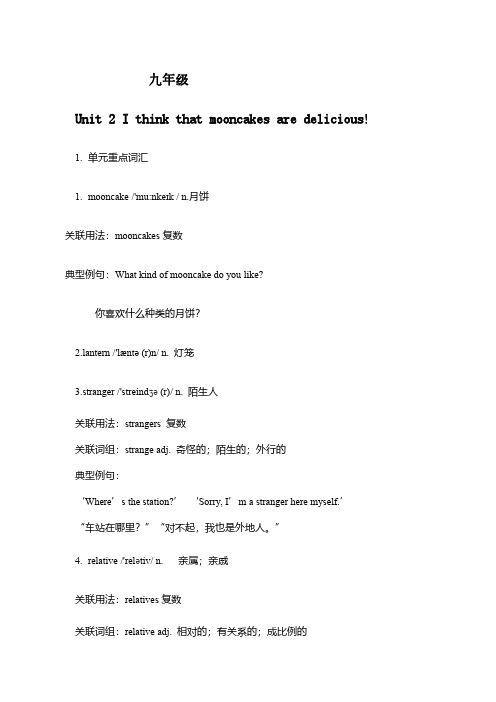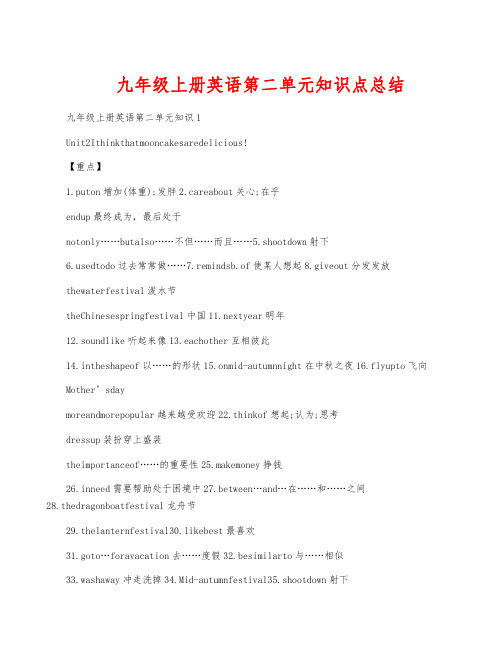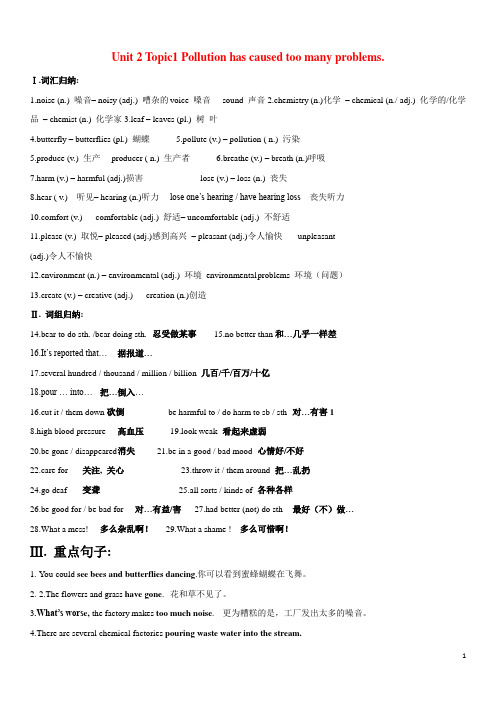九年级英语第二单元知识点归纳
九年级上册英语第二单元知识点

九年级上册英语第二单元知识点一、重点单词和短语1. communicate: 沟通2. represent: 代表3. common: 常见的4. experience: 经历5. anxiety: 焦虑6. encourage: 鼓励7. memorize: 记忆8. struggle: 奋斗9. participate: 参与10. expression: 表达11. nervous: 紧张的12. effective: 有效的13. properly: 正确地14. pronunciation: 发音15. progress: 进步二、重点语法1. 一般现在时:表示经常性、习惯性的动作或事实。
例如:She always gets up early.2. 现在进行时:表示现在进行的动作。
例如:They are playing basketball now.3. 一般过去时:表示过去发生的动作或状态。
例如:I saw a movie yesterday.4. 过去进行时:表示过去某一时刻正在进行的动作。
例如:She was studying when I called her.5. 一般将来时:表示将来要发生的动作或事件。
例如:We will visit Beijing next month.三、重点句型1. How do you communicate with your friends?你是如何与你的朋友沟通的?2. I usually talk to them on social media.我通常在社交媒体上与他们交谈。
3. English is important for communication.英语对于沟通来说很重要。
4. I have some experience in learning English.我在学习英语方面有一些经验。
5. Don't be nervous and just enjoy the process.不要紧张,尽情享受这个过程。
人教版九年级英语第二单元知识点梳理

人教版九年级英语第二单元知识点梳理Unit 2 I think that moon cakes are delicious!一、短语:1.the Lantern Festival元宵节2.the Dragon Boat Festival端午节3.the Water Festival泼水节4.remind sb.of使某人想起5.eat five meals a day一天吃五餐6.put on five pounds体重增加了五磅7.treat sb.with.用/以……对待某人8.be similar to...与.......相似9.end up最终成为/处于10.share sth.with sb.与……分享……11.as a result结果12.one...the other...(两者中的)一个…另一个…13.take sb.out for dinner带某人出去吃饭14.dress up乔装打扮15.haunted house鬼屋16.the beginning of new life新生命的开始二、知识点:1.宾语从句:(三大考点:引导词、时态和语序。
)宾语从句在复合句中作主句的宾语,由连接词+主语+谓语构成,常由下面的这些词引导:①由that引导,表示陈述意义,that可省略:He says(that)he is at home.他说他在家里。
②由if或whether引导,表示一般疑问意义(带有是否、已否、对否等):I don’t know if/whether Wei Hua likes fish.我不知道韦华是否喜欢鱼。
③由连接代词、连接副词(疑问词)引导,表示特殊疑问意义:Do you know what he wants to buy?你知道他想要买什么吗?④从句时态要与主句一致:当主句是一般现在时,从句根据情况使用任何时态;当主句是一般过去时,从句应使用过去某时态(一般过去时,过去进行时,过去将来时,过去完成时)He said(that)he was at home.他说他在家里。
九年级英语unit2知识点总结

九年级英语unit2知识点总结九年级英语Unit 2知识点总结Unit 2是九年级英语中的一单元,内容主要包括一些日常生活中的常用英语表达和语法知识。
在这个单元里,我们将学习如何描述人物、事物以及地点,并且掌握一些重要的语法规则,比如名词的用法、形容词和副词的比较级和最高级等。
一、描述人物在Unit 2中,我们学习了如何用英语来描述人物。
要描述一个人,我们可以用外貌特征、性格特点、兴趣爱好等方面的词汇来进行描绘。
例如:1. 外貌特征:He has short black hair and wears glasses.(他有短发,戴眼镜。
)She is tall and has blue eyes.(她个子高,眼睛是蓝色的。
)2. 性格特点:He is kind and helpful.(他很友善,乐于助人。
)She is shy but very smart.(她很害羞,但非常聪明。
)3. 兴趣爱好:He enjoys playing basketball in his free time.(他喜欢在空闲时间打篮球。
)She loves reading and writing stories.(她喜欢阅读和写故事。
)二、描述事物除了描述人物,我们还可以用英语来描述事物。
在Unit 2中,我们学习了如何用形容词来描述事物的特征、颜色和大小。
例如:1. 特征描述:The car is fast and comfortable.(这辆车开起来快速又舒适。
)The house is big and spacious.(这个房子很大、宽敞。
)2. 颜色描述:Her dress is blue and beautiful.(她的裙子是蓝色的,很漂亮。
)The flowers in the garden are red and vibrant.(花园里的花是红色的,很鲜艳。
)3. 大小描述:The laptop is small and lightweight.(这台笔记本电脑小巧轻便。
九年级英语第二单元知识点归纳

九年级英语第二单元知识点归纳黄金笔记2全解:宾语从句(一)考情分析:海南省近几年中考、模拟考都几乎有一道考察宾语从句的单项挑选题,考生要十分注意此知识点。
宾语从句还能够在阅读中以长难句的形式浮现。
一、概念啥叫宾语?宾语也叫受词,它是动作的承受者。
比如I love you的you算是承受love那个动作的承受着。
宾语在句中的哪个位置?1.普通放在及物动词后面。
如:Our team beat all the others.我们的球队打败了所有其他球队。
2.有时为了强调,宾语也能够放在句首,如:Two weeks you shall have .你能够有两周的时刻。
3.名词作宾语。
Face the facts!面对现实!4.代词作宾语。
They won’t hurt us.他们不可能损害我们5. 数词作宾语。
If you add 5 to 5, you get 10假如你把5和5相加就会得到10二、宾语从句的用法:宾语是句子的一具重要成分,它能够由名词、代词、名词短语或句子充当。
当一具句子充当宾语时,那个句子就叫做宾语从句。
三、宾语从句结构:1、主句+ that(无词义,可省略)+从句(陈述句语序)2、主句+ whether / if (是否)+从句(陈述句语序)3、主句+疑咨询词+从句(陈述句语序)【将在第三单元说解】四、宾语从句的引导词:引导宾语从句的引导词按所引导的句子结构特点能够分为三类。
1、that 引导的宾语从句:原句假如是陈述句,变宾语从句时要用 that 引导,that 无实义,只起到引导的作用。
在口语和非正式文体中常可省略。
如:(1)I think (that) I can sell newspapers.我想我能够卖报纸。
(2) I know (that) he is a Canadian athlete.我懂他是一名加拿大运动员。
(3) Do you think (that) the children need to write.你以为小孩们需要写一首歌吗?(4)Maria says (that) she doesn’t like the uniforms.玛丽亚讲她别喜爱校服。
九年级英语2单元知识点总结

九年级英语2单元知识点总结一、重点单词。
1. used to.- 用法:used to + 动词原形,表示过去常常做某事,暗指现在不做了。
例如:I used to play football every day after school, but now I'm too busy.(我过去放学后每天都踢足球,但现在我太忙了。
)- 否定形式:didn't use to或used not to。
例如:He didn't use to like reading. = He used not to like reading.(他过去不喜欢阅读。
)- 一般疑问句形式:e to...?或Used...to...? 例如:Did you use to be afraid of the dark? = Used you to be afraid of the dark?(你过去害怕黑暗吗?)2. dark.- 词性:形容词,意为“黑暗的;昏暗的”;名词,意为“黑暗;暗处”。
例如:It's too dark in this room.(这个房间太暗了。
);Cats can see clearlyin the dark.(猫在黑暗中能看得很清楚。
)3. spider.- 词性:名词,意为“蜘蛛”。
复数形式为spiders。
例如:There is a spider on the wall.(墙上有一只蜘蛛。
)4. insect.- 词性:名词,意为“昆虫”。
例如:Ants are very small insects.(蚂蚁是非常小的昆虫。
)5. terrify.- 词性:动词,意为“使害怕;使恐惧”。
常见搭配:terrify sb.例如:The loud noise terrified the baby.(巨大的噪音吓坏了婴儿。
)- 形容词形式:terrified(感到害怕的,用来形容人)和terrifying(令人害怕的,用来形容事物)。
九年级英语人教版第二单元

人教版九年级英语第二单元知识点总结一、重点词汇解析1.mooncake /ˈmuːnkeɪk/ 月饼-解析:由moon(月亮)和cake(蛋糕)组成,是中秋节的传统食品。
-例句:We eat mooncakes on Mid-Autumn Festival.(我们在中秋节吃月饼。
)ntern /ˈlæntən/ 灯笼-解析:一种照明工具,通常在节日中使用。
-例句:There are many beautiful lanterns in the park.(公园里有很多漂亮的灯笼。
)3.stranger /ˈstreɪndʒə(r)/ 陌生人-解析:不认识的人。
-例句:Don't talk to strangers.(不要和陌生人说话。
)4.relative /ˈrelətɪv/ 亲属;亲戚-解析:和自己有血缘或婚姻关系的人。
-例句:We visited our relatives during the holiday.(我们在假期拜访了亲戚。
)5.put on 增加(体重);发胖-解析:指身体的重量增加。
-例句:She has put on some weight.(她长胖了一些。
)y /leɪ/ 放置;安放;产(卵);下(蛋)-解析:过去式和过去分词分别为laid /leɪd/。
-例句:She laid the book on the table.(她把书放在桌子上。
)二、重点短语1.the Water Festival 泼水节-解析:一些国家和地区的传统节日。
-例句:The Water Festival is very lively.(泼水节非常热闹。
)2.the Dragon Boat Festival 端午节-解析:中国的传统节日,有赛龙舟、吃粽子等习俗。
-例句:We eat zongzi on the Dragon Boat Festival.(我们在端午节吃粽子。
)3.the Spring Festival 春节-解析:中国最重要的传统节日。
九年级英语知识点第二单元

九年级英语知识点第二单元第二单元: 九年级英语知识点1. 时态与语态 (Tenses and Voice)在英语语法中,动词时态和语态的正确运用是非常重要的。
以下是九年级学生在第二单元应该了解的时态和语态知识点:1.1 一般现在时 (Simple Present Tense)一般现在时用于表示经常性或普遍性的动作、情况或习惯。
它的结构是“主语 + 动词原形”。
例句:- She plays the piano every day. (她每天弹钢琴。
)- They live in a big house. (他们住在一所大房子里。
)1.2 一般过去时 (Simple Past Tense)一般过去时用于表示过去某个时间发生的动作或状态。
它的结构是“主语 + 动词过去式”。
例句:- He studied English last night. (他昨晚学习了英语。
)- We went to the beach last summer. (去年夏天我们去海滩了。
)1.3 一般将来时 (Simple Future Tense)一般将来时用于表示将来发生的动作或情况。
它的结构是“主语 + will + 动词原形”。
例句:- I will visit my grandparents this weekend. (这个周末我会去看望我的祖父母。
)- They will have a party for their anniversary. (为了他们的周年纪念,他们将会举办一个聚会。
)1.4 现在进行时 (Present Continuous Tense)现在进行时用于表示现在正在进行的动作。
它的结构是“主语 + am/is/are + 动词的ing形式”。
例句:- She is studying for her exam at the moment. (她此刻正在为考试而学习。
)- They are playing soccer in the park. (他们正在公园里踢足球。
人教版新目标初中英语九年级全一册 知识点总结2单元

九年级Unit2I think that mooncakes are delicious!1.单元重点词汇1.mooncake/'mu:nkeɪk/n.月饼关联用法:mooncakes复数典型例句:What kind of mooncake do you like?你喜欢什么种类的月饼?ntern/'læntə(r)n/n.灯笼3.stranger/'streindʒə(r)/n.陌生人关联用法:strangers复数关联词组:strange adj.奇怪的;陌生的;外行的典型例句:‘Where’s the station?’‘Sorry,I’m a stranger here myself.’“车站在哪里?”“对不起,我也是外地人。
”4.relative/'relətiv/n.亲属;亲戚关联用法:relatives复数关联词组:relative adj.相对的;有关系的;成比例的5.put on增加(体重);发胖关联用法:put on:穿上;上演;增加;假装;使…上场关联词组:put away储存(钱);储存…备用;储蓄put back拨回;向后移put down写下;记下;镇压put forward提出(意见、建议)put in打断;插嘴put off延期;推迟典型例句:She put on her coat and went out.她穿上外套,出去了。
Inactive people often put on weight later in life.不好动的人常常会在今后的生活中发胖。
6.pound/paund/n.磅(重量单位);英镑7.folk/fəul k/adj.民间的;民俗的8.goddess/'gɔdes/n.女神9.whoever/huːˈevə/pron.无论谁;不管什么人关联用法:whoever可以写成no matter who典型例句:I’ll take whoever wants to go.谁想去我就带谁去。
人教版英语九年级unit2知识点

Unit 2 I think that mooncakes are delicious!Language points and summary1. stranger n. 陌生人(可数名词)strange adj. 陌生的,奇怪的e.g. Don’t talk to strangers. 不要和陌生人说话。
There is nothing strange in the room. 房间里没有奇怪的东西。
2. relative n. 亲属,亲戚(可数名词)e.g. They have a lot of relatives. 他们有许多亲戚。
3. put on 增加(体重);发胖;穿上e.g. They’ve put on five pounds. 他们体重增加了5磅。
It’s cold outside. Please put on your coat. 外面冷,请穿上大衣。
4. pound n. 磅;英镑(可数名词)e.g. The desk weighs 5 pounds. 这张课桌重5磅。
5. People go on the streets to throw water at each other.throw at 抛向;泼向;洒向动词throw后接所投掷的物体,用介词at引入泼洒的对象。
e.g. On our way here, someone threw a stone at our car, but fortunately wewere not hit.在我们来的路上,有人向我们的车投掷石块,所幸的是我们没被砸中。
It’s the first snow of the year, and the children are happily throwing snowballs at each other.这是今年的第一场雪,孩子们高兴地拿雪球相互抛着。
1. Chinese people have been celebrating Middle-Autumn Festival andenjoying mooncakes for centuries.for centuries 几百年2. They carry people’s wishes to the families they love and miss.它们把人们的祝愿带给他们热爱和想念的家人。
九年级上册英语第二单元知识点总结

九年级上册英语第二单元知识点总结九年级上册英语第二单元知识1Unit2Ithinkthatmooncakesaredelicious!【重点】1.puton增加(体重);发胖2.careabout关心;在乎endup最终成为,最后处于notonly……butalso……不但……而且……5.shootdown射下edtodo过去常常做……7.remindsb.of使某人想起8.giveout分发发放thewaterfestival泼水节theChinesespringfestival中国11.nextyear明年12.soundlike听起来像13.eachother互相彼此14.intheshapeof以……的形状15.onmid-autumnnight在中秋之夜16.flyupto飞向Mother’sdaymoreandmorepopular越来越受欢迎22.thinkof想起;认为;思考dressup装扮穿上盛装theimportanceof……的重要性25.makemoney挣钱26.inneed需要帮助处于困境中27.between…and…在……和……之间28.thedragonboatfestival龙舟节29.thelanternfestival30.likebest最喜欢31.goto…foravacation去……度假32.besimilarto与……相似33.washaway冲走洗掉34.Mid-autumnfestival35.shootdown射下callout大声呼喊thetraditionof……的传统38.atnight在夜里;在晚上one…,theother…一个……,另一个…...Father’sday【重点句型】Ithinkthatthey’refuntowatch.我认为它们看着很有意思。
Whatdoyoulikeabout…?WhatdoyoulikebestabouttheDragonBoatFestival?关于,你最喜欢什么?Whatagreatday!多么美好的一天!4.1wonderif…Iwonderifit’ssimilartotheWaterFestivaloftheDaipeopleinYunnanProvince.我想知道它是否与云南傣族的泼水节相似。
人教九年级英语Unit2-unit5单元知识点归纳

unit2 短语句子第一课时一、常用短语1.put on five pounds体重增加了五磅put on sth穿戴上2. in two weeks 两星期之后(用how soon 提问)How soon will you come back? I will come back in two week.3.be similar to... 与....相似be the same as和…一样be different from与..不同4.good luck 好运气adj. lucky adv.luckily5.throw water at each other互相泼水throw(sth)-threw 扔某物6.visit relatives 拜访亲戚二、重点句式1.What do you like best about the Dragon Boat Festival?关于龙舟节你最喜欢什么?2. He wonders/ wants to know whether/if they’ll have zongzi next year.3. Sounds like fun=Sounds fun!听起来有趣!第二课时一、常用短语1.celebrate the festival庆祝节日2. the shape of a full moon 满月的形状3.carry people’s wishes承载着人们的祝福4.traditional folk stories 传统的民间故事5.shoot down nine suns 射下九个太阳shoot-shot6.take the medicine服药,吃药take-took7.try to do sth 尽力干某事try one’s best to do sth8.refuse to do sth 拒绝干某事9.on mid-autumn night 在中秋之夜10. flew up to the moon 飞向月亮fly-flewid out some fruit摆放一些水果lay-laid12.admire the moon 赏月13. share sth. with sb. 与……分享……14. live forever 长生不老15.steal sth from… 从...偷...(stole ,stolen)16. as a result,结果是17.for centuries 持续几个世纪hours、months、years 二重点句子1.Whoever took the medicine could live forever.无论谁服了这药都能长生不老。
九年级英语第二单元知识点

九年级英语第二单元知识点
【原创实用版】
目录
1.九年级英语第二单元概述
2.单元重点知识点
3.难点及解决方法
4.如何学习本单元知识
正文
一、九年级英语第二单元概述
九年级英语第二单元是中学英语学习中的一个重要环节,本单元的主题为“人与自然”,旨在让学生了解自然环境的重要性,提高环保意识。
通过学习本单元,学生将掌握一些关于自然环境的基本词汇和表达,以及如何描述和表达自己对环境的看法。
二、单元重点知识点
1.词汇:本单元的重点词汇包括自然环境、动植物、保护环境等方面的词汇,如 nature、environment、animal、plant、protect 等。
2.句型:本单元的句型包括描述自然环境的句型、表达观点的句型等,如"The environment is getting worse." "We should protect the environment."等。
3.语法:本单元的语法重点是情态动词的用法,如 can、may、must 等。
三、难点及解决方法
1.难点:本单元的难点在于如何正确使用情态动词表达观点,以及如何描述自然环境。
2.解决方法:通过例句学习和练习,掌握情态动词的用法;结合图片、
实物等资源,进行环境描述的练习。
四、如何学习本单元知识
1.预习:提前预习本单元的词汇、句型、语法等知识点,了解重点和难点。
2.听课:认真听讲,理解教师对知识点的讲解,积极参与课堂讨论。
3.练习:通过课后作业、练习题等形式,巩固和提高本单元的知识。
4.复习:定期复习本单元的知识,确保掌握程度。
九年级英语第2单元笔记

九年级英语第2单元笔记以下是一份九年级英语第2单元的笔记。
九年级英语第2单元笔记一、重点单词和短语表示建议的短语:should do sth./recommend doing sth./advise doing sth.表示喜欢和享受的短语:enjoy doing sth./be fond of doing sth./like doing sth.表示能够和可以的短语:be able to do sth./can do sth.表示停止做某事的短语:stop doing sth./quit doing sth.表示忘记做某事的短语:forget doing sth./remember to do sth.二、重点句型1、What do you think of…?/How do you like…?:询问对某人或某事的看法。
2、It's said that…:据说……3、It's a pity that…:遗憾的是……4、It's suggested that…:建议……5、It's important to do sth./It's necessary to do sth./It's essential to do sth.:做某事是重要的/必要的/必须的。
6、It's a pleasure to do sth./It's a joy to do sth./It's a delight to do sth.:做某事是一种愉快/欢乐/欣喜。
7、It's a waste of time to do sth./It's a waste of money to do sth.:做某事是浪费时间/浪费金钱。
8、It's a good idea/It's a great idea/It's a terrific idea:这是一个好主意/这是一个伟大的主意/这是一个极好的主意。
人教版九年级英语第二单元知识点总结

人教版九年级英语第二单元知识点总结Unit 2 I think that mooncakes are delicious一单词mooncake lantern stranger relative put on pound folk goddess whoever steal lay out dessert garden tradition admire tie haunted ghost trick treat spider Christmas lie novel eve dead business punish warn end up present warmth spread lay二1.put短语put on 增加,穿上 put up张贴,搭建,举起 put away收拾好put off(doing)推迟 put down记下,放下 put out扑灭 put into放进ylie – lied – lied-lying,说谎lie—lay – lain-lying,躺/位于,存在于lay—laid – laid-laying, 放置/下蛋,产卵3.admireadmire sb, admire sth, admire sb for sthsounds/looks/tastes/feels/smells + adj.sounds/looks/tastes/feels/smells +like +n.4.tie v 系 n 领带 /present n=gift礼物在场的 be present 目前 at presentmean adj 小气的 v 意思是,意味着mean doing sth打算做某事 mean to do sth5.play a trick on sb /play tricks on sb be a time for doing sth/to do sthtrick or treat (万圣节用语)不给糖果就捣蛋6.treat/regard/see sb as+ n7.warn sb (not) to do sthput…around…(put things like spiders and ghosts around the door) 放在…周围take/show sb around带某人四处转8.end upend up with后面的宾语是其主语的一部分,而end up in后面的宾语是其主语(一件事情、一个活动等)的结果。
九年级英语Unit2笔记

Unit 2 (Section A)一、词形转换1.stranger(n.)陌生人adj. strange奇怪的2.tradition(n.)传统adj.traditional传统的3.tie(v.)捆;束现在分词tying过去式/过去分词tied4.steal(v.)偷过去式stole过去分词stoleny(v.)放置过去式/过去分词laid现在分词laying二、必背词组1..become more and more popular变得越来越流行2.put on 增加(体重);发胖3.be similar to...与……相似4.wash away冲走;清洗5.sound like 听起来像6. in the shape of...以……的形状7.the hottest month of the year一年中最热的月份8. folk stories 民间故事9.the most touching 最感人的10.from...to... 从……到……11.throw...at... 朝……扔……12.call out one's name to...对着……喊出某人的名字13.carry wishes to sb.把祝福带给某人14.shoot down射下y out 摆开;布置16.plan to do sth.计划做某事17.refuse to do sth.拒绝做某事18.fly up to...飞向……19.Mother's Day母亲节20.take sb.out for dinner 带某人外出吃晚饭21.Father's Day父亲节22.one...the other...(两者)一个……另一个……23.the tradition of admiring the moon and sharing mooncakes 赏月和分享月饼的传统三、必背句型1.What a great day!多么棒的一天!2. I guess it was a little too crowded.我猜它有点儿太拥挤了。
九年级英语Unit2知识点:第二单元

九年级英语Unit2知识点:第二单元知识点对朋友们的学习非常重要,大家一定要认真掌握,为大家整理了九年级英语Unit2知识点:第二单元,让我们一起学习,一起进步吧! 1. used to do sth. 过去常常做某事 否定形式: didn’t use to do sth. / used not to do sth. 如:He used to play football after school. 放学后他过去常常踢足球。
Did he use to play football? Yes, I did. No, I didn’t. He didn’t use to smoke. 他过去不吸烟。
2. 反意疑问句 ①肯定陈述句+否定提问 如:Lily is a student, isn’t she? Lily will go to China, won’t she? ②否定陈述句+肯定提问如: She doesn’t come from China, does she? You haven’t finished homework, have you? ③提问部分用代词而不用名词Lily is a student, isn’t she? ④陈述句中含有否定意义的词,如:little, few, never, nothing, hardly等。
其反意疑问句用肯定式。
如: He knows little English, does he? 他一点也不懂英语,不是吗? They hardly understood it, did they?他们几乎不明白,不是吗? 3. play the piano 弹钢琴 4. ①be interested in sth. 对…感兴趣 ②be interested in doing sth. 对做…感兴趣 如:He is interested in math, but he isn’t interested in speaking。
九年级英语上册第二单元知识点(新版)仁爱版

Unit 2 Topic1 Pollution has caused too many problems.Ⅰ.词汇归纳:1.noise (n.) 噪音– noisy (adj.) 嘈杂的 voice 嗓音sound 声音2.chemistry (n.)化学– chemical (n./ adj.) 化学的/化学品– chemist (n.) 化学家3.leaf – leaves (pl.) 树叶4.butterfly – butterflies (pl.) 蝴蝶5.pollute (v.) – pollution ( n.) 污染5.produce (v.) 生产--- producer ( n.) 生产者6.breathe (v.) – breath (n.)呼吸7.harm (v.) – harmful (adj.)损害lose (v.) – loss (n.) 丧失8.hear ( v.) 听见– hearing (n.)听力lose one’s hearing / have hearing loss 丧失听力fort (v.) --- comfortable (adj.) 舒适– uncomfortable (adj.) 不舒适11.please (v.) 取悦– pleased (adj.)感到高兴– pleasant (adj.)令人愉快--- unpleasant(adj.)令人不愉快12.environment (n.) – environmental (adj.) 环境environmental p roblems 环境(问题)13.create (v.) – creative (adj.) --- creation (n.)创造Ⅱ. 词组归纳:14.bear to do sth. /bear doing sth.忍受做某事15.no better than 和…几乎一样差16.It’s reported that…据报道…17.several hundred / thousand / million / billion 几百/千/百万/十亿18.pour … into…把…倒入…16.cut it / them down砍倒be harmful to / do harm to sb / sth 对…有害18.high blood pressure 高血压19.look weak 看起来虚弱20.be gone / disappeared 消失21.be in a good / bad mood 心情好/不好22.care for 关注, 关心23.throw it / them around 把…乱扔24.go deaf 变聋25.all sorts / kinds of 各种各样26.be good for / be bad for 对…有益/害27.had better (not) do sth 最好(不)做…28.What a mess! 多么杂乱啊!29.What a shame ! 多么可惜啊!Ⅲ. 重点句子:1.You could see bees and butterflies dancing.你可以看到蜜蜂蝴蝶在飞舞。
- 1、下载文档前请自行甄别文档内容的完整性,平台不提供额外的编辑、内容补充、找答案等附加服务。
- 2、"仅部分预览"的文档,不可在线预览部分如存在完整性等问题,可反馈申请退款(可完整预览的文档不适用该条件!)。
- 3、如文档侵犯您的权益,请联系客服反馈,我们会尽快为您处理(人工客服工作时间:9:00-18:30)。
黄金笔记2全解:宾语从句(一)考情分析:海南省近几年中考、模拟考都几乎有一道考察宾语从句的单项选择题,考生要十分注意此知识点。
宾语从句还可以在阅读中以长难句的形式出现。
一、概念什么叫宾语宾语也叫受词,它是动作的承受者。
比如I love you的you就是承受love这个动作的承受着。
宾语在句中的哪个位置、1.一般放在及物动词后面。
如:Our team beat all the others.我们的球队打败了所有其他球队。
2.有时为了强调,宾语也可以放在句首,如:Two weeks you shall have .你可以有两周的时间。
3.名词作宾语。
Face the facts!面对现实!4.代词作宾语。
They won’t hurt us.他们不会伤害我们5. 数词作宾语。
If you add 5 to 5, you get 10如果你把5和5相加就会得到10二、宾语从句的用法:宾语是句子的一个重要成分,它可以由名词、代词、名词短语或句子充当。
当一个句子充当宾语时,这个句子就叫做宾语从句。
三、宾语从句结构:?1、主句+ that(无词义,可省略)+从句(陈述句语序)2、主句+ whether / if (是否)+从句(陈述句语序)3、主句+疑问词+从句(陈述句语序)【将在第三单元讲解】四、宾语从句的引导词:引导宾语从句的引导词按所引导的句子结构特点可以分为三类。
1、that 引导的宾语从句:原句如果是陈述句,变宾语从句时要用 that 引导,that 无实义,只起到引导的作用。
在口语和非正式文体中常可省略。
如:(1)I think (that) I can sell newspapers.我想我可以卖报纸。
(2) I know (that) he is a Canadian athlete.我知道他是一名加拿大运动员。
(3) Do you think (that) the children need to write.你认为孩子们需要写一首歌吗<(4)Maria says (that) she doesn’t like the uniforms.玛丽亚说她不喜欢校服。
2、whether/if引导的宾语从句(weather是天气的意思,不要和whether搞混)原句如果是一般疑问句,变宾语从句时要用whether /if 引导,whether /if意为“是否”。
如:(1)I want to know whether / if people will leave as soon as they finish eating in western countries. 我想知道西方国家的人是否是一吃完饭就离开。
(2)Could you tell me if /whether it’s polite to speak loudly at the table你能不能告诉我吃饭时大声讲话是否有礼貌(3) I don’t know if/whether you are right. 我不知道你是否正确。
注意:whether/if 引导的宾语从句用法区别:用whether /if “是否”引导的宾语从句,通常情况下whether /if 可以互换。
但以下情况 whether 不能用if 换。
(1)[(2)Whether后面紧跟有or not时。
如:I don’t know whether or not it rains. 我不知道是否会下雨。
(3)whether 引导主语从句位于句首首时。
如:Whether they will go by air or by train hasn’t decided.他们是乘飞机去还是乘火车去还没有定下来。
(4)whether 用在带有to的动词不定式之前。
如:Please tell us whether to go or stay. 请告诉我们是去还是留。
(5)有些动词 (如:discuss) 后面只能跟whether,不能跟if。
如:|We discussed whether we should let him join our team. 我们商量是否让他加入我们队。
(5) whether 可以与虚词it连用,并可引导不定式,但if 不能这样用。
如:It’s not clear whether he will be able to come。
他是否会来还不清楚练习:you know _____ to raise moneycan have a food festival.can we do we can do will we doasks _____ she can use this pen.?3—Do you know ________—Yes. It’s on your table.A. where my dictionary isB. where is my dictionaryC. when I bought my dictionarydon’t know _____ we can go or notsaid _____ he wanted to be a teacher in the future|全解:感叹句考情分析:海南省近几年中考、模拟考都几乎有一道考察感叹句的单项选择题,考生要十分注意此知识点。
一、概念什么叫感叹句表示人体喜怒哀乐,末尾有“!”的句子。
二、做题方法(针对选择题):一断·二辨·三确定:构成感叹句的感叹词有两个:what和how,其基本结构是:1)What+(a/an)+形容词+名词+(主语+谓语):}2)How+形容词(或副词)+(主语+谓语)很多初学者常常对该用what还是该用how弄不清楚。
如:①____cold water this is!A.How B.What如果我们采取“一断·二辨·三确定”的方法很快就能确定该选哪个感叹词。
①“一断”就是在句中的名词(或形容词、副词等)与代词(或名词)之间断开。
例如上面第一句应在water与this中断开(因this是指示代词),____cold water|this is!②“二辨”就是断开后辨别断线前面的词的词性。
句①中断线前的词是water,而water是名词。
③“三确定”就可迅速选择如果是名词就选what,形容词/副词就选how。
所以第一例句就选B。
用这个方法我们会对上面第二个例句作出如下判断:____cold|it is!断开线其前cold是形容词,故应填How。
"上面两个例句是最基本最简单的填空题形式。
但只要掌握这个方法,即使再复杂的填空题也会迎刃而解。
不过还要注意,如果断开后,断线前的那个中心词【就是这句话(这段话)紧紧围绕着进行论述的词】是单数可数名词,千万别忘了在感叹词与名词间加冠词a(an)。
练习:1.— sweet music it is!—And I really like the Voice of China TV programs.a ahonest man he is!A. WhatB. What anC. HowD. How an3. funny the joke is! It makes us smile from ears to ears.·an an4.—A number of people ___ killed by the terrorists at the Urumqi train station.—_______ terrible it is!A. were; HowB. was; HowC. were; WhatD. was; What5. ____ nervous the girl is!She can hardly say a word in the speechaat Miss Wu‘s bag. ____ nice it is!a在解答的时候,首先我们要浏览一遍问题,看清问题需要理解什么细节,然后有选择地在文中找出相对应的段落、句子或短语,认真分析与理解,最终确定正确答案。
答案一般能直接在原文中找到。
例:Twenty minutes passed and it was still raining. There were hours to go before we reached the campsite (野营地). It was even worse that our small compass (指南针) showed that we went to the wrong way. We had lost our way!We had to make a quick decision as it was raining heavily. Chris said we could set up a tent to hide in, so Mary and Tom helped to set up the tent. Chris and I tried to make a fire to keep us warm.Question: was even worse that they ____no picnic their way’t light the fire ’t know each othersuggested that they should ____ in the rainup a tent the campsite,singing a place to hide解释:由第一段It was even worse that our small compass (指南针) showed that we went to the wrong way. We had lost our way! 可知他们迷路了,选B从Chris said we could set up a tent to hide in可知,是建议搭帐篷,选A1.be similar to 与···相似2.现在完成进行时表示动作在迄今为止的一段时间内曾经延续进行或目前仍在继续并有可能一直继续下去,强调动作持续进行的状态。
常和for+时间段或since+时间点连用。
其结构为have/has been+动词的现在分词。
如课本里面的句子:chinese people have been celebrating (现在完成进行时,表示中国人吃月饼的习俗从古到今一直延续着并有可能一直继续这个习俗下去)the Mid-Autumn Festival and enjoying mooncakes forcenturies.3.Steal sth from从···偷某物4.:y out 摆开,布置6.the tradition of···意为···的传统7.admire sb/sth欣赏某人/某事;admire sb for(doing)sth因(做)某事佩服某人8.as a result意为结果,因此;as a result of 意为因为,由于,相当于because of9.treat···as把···当作10.dress up 装扮;dress up as装扮成,as后面接表示角色职业等名词;dress up in意为穿上,后接表示衣服或颜色的名词11.hate to do sth/hate doing sth讨厌做某事12.on business 因公出差13.>14.warn sb(not)to do sth告诫某人(不要)做某事;warn sb of/against(doing)sth意为告诫某人当心/提防某事15.remind sb to do sth提醒某人做某事;remind sb of sb/sth使某人想起某人/某事;remind+that从句16.be scared of sth害怕某事某事;be scared to do sth害怕做某事17.change one’s life改变某人的生活18.promise sb to do sth承偌某人做某事19.in need处于困境中20.the beginning of···的开始21.play a trick on sb戏弄某人22.make money 赚钱本单元的写作话题是介绍某个传统节日或写出自己最喜欢的节日。
